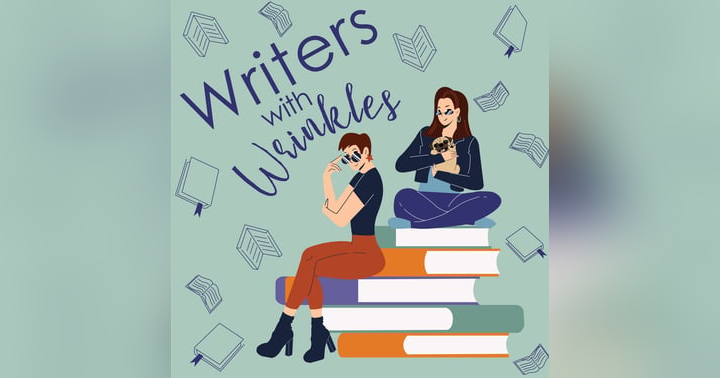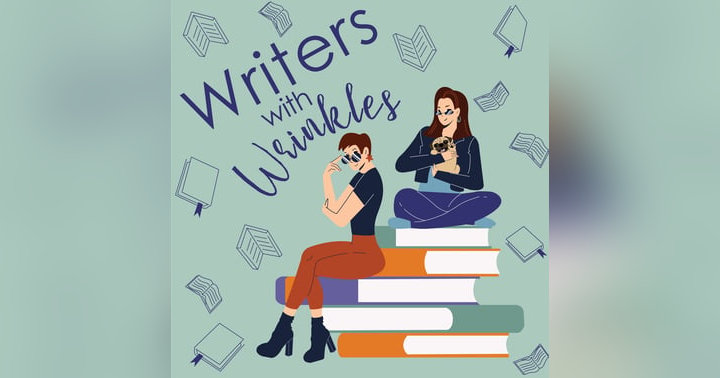BONUS EPISODE: Telling Hard Stories With Humor: How Author Adam Rosenbaum Balances Heart, Grief & Laugh-Out-Loud Middle Grade Magic

Middle grade readers are living in a complicated world. They’re navigating big feelings, uncertainty, and a landscape full of noise and screens. But if there’s one thing today’s kids want from their books—and Adam Rosenbaum sees this firsthand—it’s humor. Real, honest-to-goodness laughter. The kind that lowers defenses, opens emotional doors, and makes even the heaviest topics feel manageable.
In this special bonus episode of Writers With Wrinkles, Beth and Lisa sit down with Adam—author of the beloved middle grade novel The Ghost Rules—to explore how he blends emotional depth with joyful, kid-centered comedy. It’s a conversation full of inspiration, craft insight, and behind-the-scenes wisdom for writers who want to connect with young readers in authentic, meaningful ways.
Why Humor Matters More Than Ever for Middle Grade Readers
Adam sees it in every school visit and classroom conversation: kids love to laugh. Humor helps them approach stories that might otherwise feel too intimidating or too emotionally heavy. It becomes a pressure release valve, a way to breathe through big topics—like grief, loss, and fear—without becoming overwhelmed.
He talks about humor as a tool that:
Makes reading feel safer
Encourages even reluctant readers to turn the page
Opens space for deeper emotional resonance
Builds trust between author and reader
As Beth puts it, humor creates “reading gold” because it infuses a story with those feel-good endorphins kids will forever associate with the book. And when kids love something, they share it. They read it again. They tuck it into their backpacks.
Which brings us to one of the best phrases in the episode…
What Are “Backpack Books”?
During edits for Adam’s upcoming series, his Sourcebooks editor used a phrase Adam instantly fell in love with: backpack books. These are the books kids choose on their own—the ones they sneak into class, take on the bus, or reread at night with a flashlight.
They’re not assigned.
They’re not forced.
They’re adored.
And more often than not, they’re funny.
Humor isn’t secondary for kids. It’s magnetic.
The Amblin DNA: Heart + Humor + Stakes
Adam’s storytelling instincts are shaped by the movies he grew up with—the Amblin-era classics like E.T., The Goonies, Back to the Future, Flight of the Navigator. Films that were fun and fast and full of jokes… but also quietly dealing with divorce, loneliness, identity, friendship, growing up, and all the things kids feel even when adults forget they do.
He describes that blend as baked into his creative DNA. When he sits down to write, he's not thinking: “I’m going to balance humor with heartbreak.” He’s thinking: This is the story. This is how it sounds in my head.
That instinctive blend is exactly what makes The Ghost Rules such a standout.
Finding Your Voice (Even When the Advice Makes No Sense)
Every writer hears it early: Find your voice.
Every beginner thinks: What does that even mean?!
Adam shares his own turning point—after years of reading interviews, attending conferences, and feeling frustrated by how vague that advice seemed. Then one day, while drafting something new, his voice just… appeared. The rhythm, the wit, the “confident idiots” (his phrase) that populate his work.
Beth describes this as a kind of creative alchemy: the moment your influences, instincts, and lived experience finally merge into something that sounds like you.
Writers can’t force it. They get there through doing the work—messy drafts, experiments, bad pages, false starts, and tiny discoveries that eventually turn into something real.
Kids Can Handle More Than We Think
A recurring theme in this episode is the idea that adults often underestimate what young readers can emotionally handle.
Adam talks about grief in particular—how kids define it along a wide spectrum:
A failing test
A lost friendship
A parent leaving
The death of a pet
The death of a sibling
When we avoid big topics to “protect” kids, we’re actually talking down to them. We’re ignoring the real emotions they already live with. And most importantly, we’re robbing them of stories that reflect their own experiences.
Adam’s approach in The Ghost Rules is a masterclass in this balance. When he finally reached the pivotal scene explaining how the main character’s brother died, he wrote the entire chapter in one emotional burst. He wanted it to be honest but not traumatizing—a meaningful moment that children could absorb without shutting down.
The result is powerful, tender, and beautifully calibrated.
The Secret to Writing Humor for Kids? Don’t Talk Down to Them.
Lisa says it plainly: you can tell when an author is trying too hard to “write like a kid.”
It feels awkward. Forced. Fake.
What makes Adam’s humor land is that he’s not aiming down. He’s writing what he finds funny—his own sensibilities shaped by childhood favorites, Terry Pratchett novels, and Coen Brothers films. And kids respond to that authenticity because they feel respected.
Kids want to be seen.
They want to laugh.
They want books that treat them like full humans.
Adam’s work delivers all three.
A Sneak Peek at Adam’s Epic New Series
Adam also shares details about his upcoming middle grade time-travel series, Lawson History Stumbling Through Time, co-created with renowned pop-up book artist and illustrator Matthew Reinhardt. Each book drops Lawson into a different historical era—Ancient Egypt, Ancient Greece, and beyond—and pairs adventure with constant illustrations and Adam’s trademark humor.
Lisa calls it a guaranteed future New York Times bestseller (and she has a track record of being right).
Why This Conversation Matters for Writers
This episode is an important reminder for anyone writing for kids (or writing at all):
Humor is powerful.
Emotion matters.
Kids are savvy and perceptive.
Authenticity beats “writing down” every time.
The books that mean the most are often the ones that make us feel everything at once.
As Beth says, humor and heart aren’t opposites—they’re partners. And when woven together with intention, they create unforgettable stories.
Listen to the Full Conversation
You can catch the full episode of Writers With Wrinkles wherever you listen to podcasts.
And trust us—you’re going to want to hear the part where Taylor Swift somehow becomes the perfect metaphor for writing voice.








